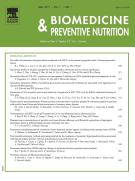Protective effect of betaine on protein, glycoproteins and amino acids in isoprenaline-induced myocardial infarction in albino rats - 13/08/14
 , Lawrance Anbu Rajan b, Rangasamy Anandan a
, Lawrance Anbu Rajan b, Rangasamy Anandan aAbstract |
Myocardial infarction is emerging as a foremost public health concern in most parts of the world even in developing countries still afflicted by infectious diseases, under nutrition and other illnesses related to poverty. There has been increasing recognition that certain natural substances have the potential to reduce the detrimental effect of a number of cardiovascular risk factors. In the present study, we have investigated the protective effect of betaine administration on changes in the levels of protein, glycoproteins and amino acids was studied in isoprenaline-induced myocardial infarction in rats as an animal model of myocardial infarction in man. Oral pre-treatment with betaine significantly attenuated (P<0.01) the isoprenaline-induced rise in the levels of troponin-T and creatine phosphokinase [CPK]. Oral supplementation of betaine also significantly (P<0.01) counteracted the isoprenaline-induced alterations in the levels of amino acids [taurine, aspartate, glutamate, arginine, hydroxy proline and homocysteine], protein content, glycoprotein components [hexose and hexosamine] and lipid peroxidation in the heart tissue and maintained their levels comparable to that of control animals. The results indicated that the overall cardioprotective effect of betaine was probably related to its ability to strengthen the myocardial membrane by its membrane stabilizing action or to a counteraction of free radicals by its antioxidant property.
Le texte complet de cet article est disponible en PDF.Keywords : Betaine, Myocardial infarction, Isoprenaline, Glycoproteins, Lipid peroxidation
Plan
Vol 4 - N° 3
P. 403-409 - juillet 2014 Retour au numéroBienvenue sur EM-consulte, la référence des professionnels de santé.
L’accès au texte intégral de cet article nécessite un abonnement.
Déjà abonné à cette revue ?

